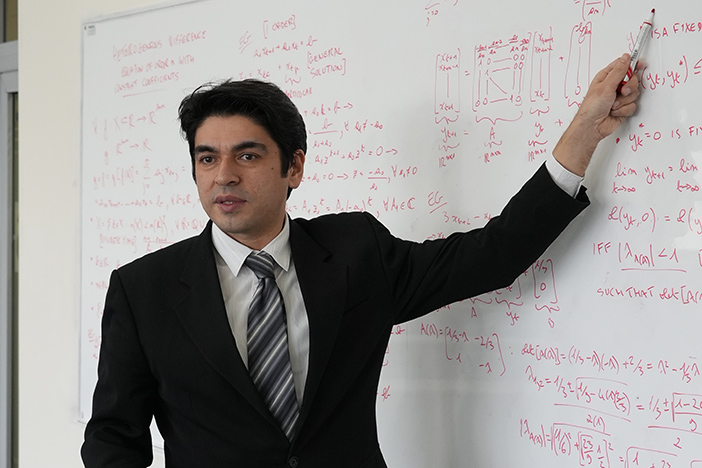BSc (Hons) in
Economics and its Pathways
Understand the interactions between the economy and the financial system, equipping yourself with theoretical knowledge and practical tools for success in economics, finance, and data-driven professions.
WIUT Business School
COURSE OVERVIEW
The BSc (Hons) in Economics and its Pathways course has been designed to give students an education in the key areas of the disciplines of economics, finance, and data science. The course enables students to understand the interactions between the economy and the financial system, providing an understanding of theories, tools, and techniques, fitting them to pursue a career in economics, finance, data science and other related areas. The combination of economics (major) with finance (minor) and data science (minor) provides an excellent platform for WIUT graduates to become successful in competitive job markets.
This programme is designed to prepare students for the realities of today’s fast-changing world of economics, finance, and digital innovation. The focus is not only on theory, rather on learning how to apply knowledge and skills to real challenges, from analysing financial markets to shaping economic policy.
The course allows students to tailor their learning by exploring specialist areas such as international and development economics, labour and monetary economics, environmental and energy economics, behavioural economics, banking and finance, data science, and machine learning. The result is a degree that combines rigorous academic training with practical experience, preparing them to graduate with the confidence, technical expertise, and professional insight to thrive in careers across finance, economics, data analysis, and policy, or to continue studies at the postgraduate level.
WHAT YOU NEED TO KNOW
Award Title
Bachelor of Science (Hons)
Start Date
September (each academic year)
Duration
3 years (full time)
Tuition Fees
Domestic - 36,292,800 UZS /per year
International - 54,600,000 UZS /per year
HOW YOU WILL STUDY
The module emphasises active student learning through seminars and lectures (including virtual), computer-lab and financial markets suite workshops, problem-based and blended learning activities designed to engage your interest. Course material will be provided through the online learning platform and is an important resource base for you, which you can access at any time and from anywhere by having access to the internet. The platform also provides a channel of communication between you and your Module Leader through blogs. This ensures a student-centric approach, focusing on your abilities, needs and learning styles, where the module leader is a facilitator of your learning.
Seminars and workshops are provided each week to provide a stimulating environment for you to work through examples and case studies, experiment with hands-on solutions in the labs, engage in group discussions or online discussions, and gain immediate feedback and support from teachers. In addition, you will be provided with a range of additional resources, which can be accessed through the University's online learning content management system, and textbooks, academic journals, and other materials available in the University’s learning resource centre, and software systems are provided in the computer labs.
- Year 1 (Level 4): 100 core credits + 20 credits of optional/elective modules build your foundation in economics, quantitative skills, and business literacy so you can interpret real data, read financial statements, and apply basic models with confidence.
- Year 2 (Level 5): 80 core credits + 40 credits of optional/elective modules deepen your analytical toolkit, preparing you to test hypotheses, model relationships, and make evidence-based financial decisions in more complex, real-world contexts.
- Year 3 (Level 6): 80 core credits + 40 credits of optional/elective modules, refine your expertise and professional focus through advanced study of economics, finance, and data science.
COURSE STRUCTURE
CORE MODULES
Module code: | 4ECON005C |
|---|---|
UK credit value: | 20 credits |
Semester: | Yearlong |
Module leader: | Zohid Askarov / Jamshid Normatov |
The first part of the module addresses microeconomic issues. The second part of the module covers issues related to the macroeconomics area, which studies the economy as a whole, including output and economic growth, inflation and unemployment, and the effects of monetary and fiscal policy. This module introduces the basic elements of the Keynesian model and addresses the main differences between the Keynesian and Monetarists’ views with respect to the role of money in the economy. It also demonstrates the relationship between inflation and unemployment, and the policy tools that might be used by governments in dealing with each policy problem.
Assessment: Semester 1 and 2 exams primarily test the ability of students to formulate a given set of information in the context of basic microeconomic models, solve basic quantitative problems of economic models, and distinguish between different theoretical approaches. The group report and presentation that the students will have to complete in Semester 2 will cover microeconomics and/or macroeconomics topics.
Module code: | 4ECON013C |
|---|---|
UK credit value: | 20 credits |
Semester: | Second semester |
Module leader: | Olmas Isakov |
The module introduces students to basic statistical concepts, critical reasoning, and understanding of the nature of data, which they may need to apply in the other modules they intend to study in their degree. The emphasis of the module is on the application of statistical methods to tackle real-world, data-rich problems in economics, finance, business, and academia. Attention will focus on the calculation and interpretation of tables and results, and the appropriate method to approach various aspects of real-world situations. Treatment is at an elementary mathematical level (basic calculus).
Assessment: Assessment 1 is an in-class test that serves as a summative assessment and covers the fundamental concepts and techniques taught in the first half of the module, ensuring that students have a solid understanding of the basics of statistics. Assessment 2 is an exam that takes place during the final exam week of the Semester and covers the concepts taught during the entire semester.
Module code: | 4ECON007C |
|---|---|
UK credit value: | 20 credits |
Semester: | First semester |
Module leader: | Farrukh Ataev |
The module will enable students to analyse economic and business decisions using basic mathematical tools. Emphasis will be placed on the application of mathematical tools to solve selected economic and business problems, and it is built on the Quantitative Methods module taught at the foundation level.
Assessment: Assessment 1 is an In-class Test and it will consist of sets of multiple-choice, open-ended, or problem-solving questions, which should cover lecture and tutorial materials. Assessment 2 is a closed-book exam that will test students’ grasp of the mathematical techniques used in economics and business.
Module code: | 4ECON012C |
|---|---|
UK credit value: | 20 credits |
Semester: | First semester |
Module leader: | Bilol Buzurukov |
Globalisation has created a constantly changing and interconnected international economic environment. This module draws on economic analyses to provide critical insights and analysis of the causes, consequences, and solutions to a diverse range of contemporary economic issues. These include international labour migration, international trade disputes, global financial crises, and the challenges of the global value chain that disrupt economic development.
Assessment: The group coursework will enable students to work in groups, improve their presentation skills and critical thinking. Students are encouraged to produce a high-quality research output in line with the theoretical and practical knowledge gained from lectures and seminars. Moreover, the students are required to follow research ethics in using online content with the help of advanced technology (AI). The exam will test the breadth of understanding of global policy issues, using a range of theoretical and practical perspectives.
Module code: | 4ECON009C |
|---|---|
UK credit value: | 20 credits |
Semester: | Second semester |
Module leader: | Murodullo Bazarov |
The purpose of this module is to introduce the basic principles of corporate finance to the student. Starting with fundamental concepts of time value of money, the module progresses through valuation of financial instruments (bonds and stocks), investment decision-making criteria, risk-return relationships, and the workings of financial markets. These principles form the essential knowledge for either a career in corporate finance or further education in investments, banking, and insurance. The module incorporates current market developments and practices while maintaining focus on core theoretical foundations.
Assessment: There are two assessment components in this module: a case-based in-class test and an applied case study analysis. The In-class test will be in the form of a time-constrained test based on pre-seen case studies to be held during the semester. The Case Study will be held in the form of a written report within a constrained time, based on cases that will be provided to the students along with the task, and as such is designed to train students to apply their knowledge through dealing with a range of issues within a limited time.
PLUS ONE OPTION OR ONE ELECTIVE
Module code: | 4ECON011C |
|---|---|
UK credit value: | 20 credits |
Semester: | Second semester |
Module leader: | Farrukh Ataev |
This module will enable students to analyse economic and business decisions using basic mathematical tools. Emphasis will be placed on the application of mathematical tools to solve selected economic and business problems. Students will need to know how to solve economic problems by mathematics. By the end of the module, a student should know the principal methods of optimisation, financial mathematics, dynamic analysis of economic processes, and fundamental concepts of integration and differential equations.
Assessment: There are two types of summative assessment used in this module: an in-class test and an exam. There are also homework tasks which serve as formative assessment and are designed to provide constant feedback to students on their progress.
Module code: | 4ACCN008C |
|---|---|
UK credit value: | 20 credits |
Semester: | Second semester |
Module leader: | Dr. Yury Karaleu |
Financial Accounting is an important language of any business. This module will help students develop knowledge and understanding of the underlying principles and concepts related to financial accounting. By the end of the module, students will be able to record financial transactions using double-entry rules, report financial information in the form of financial statements, and analyse financial information. Students will also be familiarised with appropriate digital tools used in the real business world. This module is designed to closely align with the syllabus prescribed by the ACCA.
Assessment: As an ACCA-accredited module, it is essential that the assessment methods reflect the demanding exam formats used by ACCA itself. This alignment guarantees that students are not only learning the content but also practising the types of assessments they will face in their professional qualifications. Successful completion gives our students the right to apply for an ACCA exemption on the corresponding paper. By dividing the learning outcomes between the In-class Test and the End-of-module Exam, students benefit from a balanced and structured approach to their learning journey. The In-class Test focuses on assessing the ACCA-accredited initial set of learning outcomes, providing students with an early opportunity to demonstrate their understanding and receive constructive feedback. The end-of-module exam then continues to assess the remaining learning outcomes, ensuring that students have mastered the entire scope of the module content.
Module code: | 4FNCE002C |
|---|---|
UK credit value: | 20 credits |
Semester: | Second semester |
Module leader: | Dr. Hasan Umarov |
The module provides an overview of how the insurance industry operates, the range of products it provides in the marketplace, and the fundamental principles of insurance. It also introduces the main participants in the insurance market, its regulatory standards, as well as the role and importance of ethics in the insurance industry. In addition, it provides a basic overview of Islamic insurance and the insurance market of Uzbekistan.
Assessment: In the module, the assessment methods are carefully aligned with the Chartered Insurance Institute (CII) syllabus to ensure relevance. This alignment ensures that students are not only mastering the content but are also preparing for the types of assessments they will encounter in their professional qualifications. The first assessment is an In-class Test conducted as a closed-book test. The second assessment is an Exam administered at the end of the module. This exam is designed to assess students' general knowledge of the main legal principles of insurance, the regulation of the insurance industry, key features of Islamic insurance and the Uzbek insurance market.
Module code: | 4BANK002C |
|---|---|
UK credit value: | 20 credits |
Semester: | Second semester |
Module leader: | Mr. Omonjon Ganiev |
The module will give you an introduction to the flow of funds in the economy, the banking sector, and financial markets and systems, all of which are essential to the functioning of corporations and modern economies. Although the module is about financial systems in general, there will be frequent references to how corporations finance their operations and invest their funds and how they compensate shareholders.
Assessment: The first assessment is an In-class. This assessment is a time-constrained, closed-book test designed to evaluate students' understanding of key banking concepts and analytical techniques. The second assessment is a group Project Presentation. This assessment is scheduled at the end of the module and focuses on evaluating students' ability to analyse financial data and communicate their findings effectively. It also assesses their capacity to construct well-reasoned arguments related to financial markets or intermediaries in a group setting.
Module code: | 4BUIS008C |
|---|---|
UK credit value: | 20 credits |
Semester: | Second semester |
Module leader: | Hamid Reza Shahbazkia |
The module introduces the basics of programming – variables, data types, conditional branching, loops, collections, and functions. Emphasis is placed on practical experience with a modern programming language.
Assessment: The module will be assessed through a computer-based PC Lab test and a practical project.
Module code: | 4COSC016C |
|---|---|
UK credit value: | 20 credits |
Semester: | Second semester |
Module leader: | Dr.Hamid Reza Shahbazkia |
The module is a general introduction to Artificial Intelligence (AI). It will introduce diverse topics of AI to students from any background. It is structured to offer students essentially practical skills in AI and its subfields that have made a significant impact, including but not limited to: Search problems, Knowledge Base Systems, Fuzzy Logic, Neural Networks, Evolutionary Computation, Computer Vision, Generative AI, Natural Language Processing, and machine learning.
Assessment: A group project that will enable students to showcase their skills and improve their teamwork abilities. The project will require the student to implement an application with a stated goal. They will then need to research, justify and implement one or a combination of techniques to achieve the stated goal. The Lab Test assesses the student’s understanding of the fundamentals and their understanding of the provided topics.
Any module from the WIUT Catalogue of Elective modules
Award of Certificate of Higher Education available
CORE MODULES
Module code: | 5ECON010C |
|---|---|
UK credit value: | 20 credits |
Semester: | First semester |
Module leader: | Muhammad Bilal |
The microeconomics module builds on the conceptual foundations of microeconomics at level 4, Exploring Economics. The module covers the conceptual tools and underlying framework necessary to demonstrate the importance of economic analysis in understanding the organisation, whether it be in the public or private sector, and to illustrate that economists often offer different interpretations about the behaviour of firms and that this has implications for public policy. This part of the module explores further fundamental decisions made by economic agents such as consumers, producers, and suppliers regarding production factors.
Assessment: Students will be assigned group coursework. The coursework will be designed to involve critical thinking regarding economic modelling, the consideration of important microeconomic variables, the use of real-world data, and a group presentation. The second assessment, examination primarily tests the ability of students to formulate a given set of information in the context of microeconomic models and to distinguish between different theoretical approaches.
Module code: | 5ECON012C |
|---|---|
UK credit value: | 20 credits |
Semester: | First semester |
Module leader: | Obid Khakimov / Gayrat Suyunov |
This module introduces students to the fundamental concepts and techniques of econometrics, a field that combines economic theory with statistical methods to analyse economic data. The primary goal is to equip students with the ability to construct and interpret econometric models for various purposes, including causal analysis, forecasting, and data validation.
Assessment: In-module assessment: In-Class Test as a summative assessment. It assesses students’ knowledge of topics covered during the module. End-of-module assessment: group coursework assessment evaluates students’ understanding of econometric models and their application for three types of data (crosssectional, times series and panel).
Module code: | 5ECON011C |
|---|---|
UK credit value: | 20 credits |
Semester: | Second semester |
Module leader: | Muhammad Bilal |
This macroeconomics module builds on the conceptual foundations of macroeconomics at level 4, Exploring Economics. Intermediate macroeconomics level 5 explores further issues and topics such as business cycles, macroeconomic policy, open-economy macroeconomics, exchange rate regimes, the role of money in the economy, and the role of institutions.
Assessment: There are two assessment components: a group coursework and a closed-book examination. The group coursework takes the form of writing a research paper/essay with a subsequent presentation. The examination primarily tests the ability of students to formulate a given set of information in the context of macroeconomic models and to distinguish between different theoretical approaches.
Module code: | 5FNCE007C |
|---|---|
UK credit value: | 20 credits |
Semester: | Second semester |
Module leader: | Dr. Hamid Waqas |
The main goal of this module is to develop a foundation of financial management concepts. This will enable students to understand how corporations make important investment and financing decisions and how they establish working capital policies. The module also lays a foundation for more complex financial topics that arise in additional elective courses in finance. This module in financial management describes the corporation and its operating environment; it will help any future manager to understand how the finances of a company work and how they will interface with finance.
Assessment: Seen-case In-class Test requires students to explain the goals and functions of financial management while analysing financial statements. The seen-case format encourages students to engage with real-world financial scenarios, fostering critical thinking and analytical skills. Group Project Presentation will involve emphasising the estimation of a firm's cost of capital, the application of working capital management techniques, and the demonstration of the time value of money. The project presentation promotes collaboration and communication skills as students work in groups to articulate financial analyses and recommendations. This approach encourages the integration of theoretical knowledge with practical applications, providing a comprehensive understanding of financial strategies and decision-making processes.
ECONOMICS OPTIONAL MODULES:
Module code: | 5ECON016C |
|---|---|
UK credit value: | 20 credits |
Semester: | First semester |
Module leader: | Ahliddin Malikov |
This module provides the basic knowledge on the subject of political economy, its historical substance, method of inquiry, scope, and finally its similarities and differences with conventional economics. The focus of the study will be upon the critical examination, analysis, dialectical interpretation, and explanation of the contemporary capitalist economy, polity, and society. The module also explores the interaction between politics and markets, both in theory and in practice.
Assessment: The module will be assessed by a group coursework with a presentation and an examination. The coursework consists of an assignment that tests students’ grasp of key concepts and issues in political economy. The examination will provide an opportunity for students to demonstrate their ability to utilise economic reasoning and data in answering a wide range of questions under a time constraint.
Module code: | 5ECON019C |
|---|---|
UK credit value: | 20 credits |
Semester: | First semester |
Module leader: | Naqeeb Ur Rehman |
The module introduces economic issues concerning the public sector, including government and its relationship with the private sector: households, businesses, and markets in a mixed economy. This module provides the most important topics in public finance. Broadly speaking, this module examines the functioning of government and its role and scope in promoting economic well-being.
Assessment: There are two assessment components: a group coursework and a closed-book examination. The group coursework is designed to test students’ ability to engage effectively in group learning to grasp the key concepts and issues related to the economics of the public sector. It aims to stimulate critical thinking, creativity, logical reasoning, and induce team effort (collaboration) among students in the learning process. In the second assessment, a closed-book time-constrained examination provides a more general assessment of students’ knowledge by testing their ability to analyse theoretical knowledge by deploying graphical models.
Module code: | 5ECON026C |
|---|---|
UK credit value: | 20 credits |
Semester: | Second semester |
Module leader: | Slava Yakubenko |
The development economics module addresses the issues of economics in the developing world, the countries of which make up over 6 billion of the world's population. This module provides the most important topics in development economics. In particular, it combines findings from economic theory, econometrics, sociology, political science, psychology and demography.
Assessment: The module will be assessed by two group coursework and one presentation.
Module code: | 5ECON027C |
|---|---|
UK credit value: | 20 credits |
Semester: | Second semester |
Module leader: | Dr. Hamid Waqas |
From the great depression to the global financial crisis of 2008, the World went through several times in crises, and it was because of the greed of the private sector, which resulted in massive output loss by creating poverty and inequality across the globe. This module is designed to provide rigorous and deep knowledge regarding the consequences of the economic crises in the past.
Assessment: The module will be assessed by individual coursework and group coursework. The individual coursework consists of an assignment that tests students’ grasp of key concepts and issues in political economy. In the group coursework, students will be evaluated based on their understanding of the key concepts from the economics of financial crises.
Module code: | 5ECON030C |
|---|---|
UK credit value: | 20 credits |
Semester: | Second semester |
Module leader: | Behzod Alimov |
The ability to conduct and apply economic research and appraisal plays a crucial role in identifying, framing, analysing, and assessing various challenges in business, management, consultancy, and public policy. This module emphasises independent research and consultancy tasks, grounded in real-world contexts, to cultivate students’ capacity for independent, collaborative, and professional work. These tasks involve exploring the graduate labour market and reflecting on both subject-specific and transferable skills essential for success in specific roles and sectors.
Assessment: This module comprises two assessment components: a group poster that is based on a research project involving a team-based analysis of the graduate labour market; an individual portfolio, which includes a cost-benefit analysis of a public sector intervention in a selected country or city, derived from an individual research project. The portfolio will also feature responses to exercises applying various appraisal techniques, along with a reflective log documenting the student’s skills development throughout the module, including their experience with AI tools in economic research.
Module code: | 5BUSS023C |
|---|---|
UK credit value: | 20 credits |
Semester: | Second semester |
Module leader: | Dr. Prabha Kiran |
This module is designed to equip students with the skills and knowledge required to analyse complex business cases from multiple perspectives. The module reflects industry demands for graduates proficient in applying popular analytical frameworks to real-world business challenges. Students will explore various case studies, utilising various tools and frameworks, and develop a multifaceted understanding of business scenarios. The module fosters critical thinking, problem-solving, and decision-making skills, preparing students for careers in consulting, management, finance, and economics.
Assessment: Assessment 1 involves writing a report based on the chosen organisation for developing the case. This task requires students to analyse the case using relevant management, marketing, finance, and economic frameworks. Assessment 2 requires students to design and write their own case study. In this task, students will learn the intricate process of case study development, which involves identifying key business challenges, framing these issues within the context of broader industry and economic trends, and considering multiple perspectives.
FINANCE OPTIONAL MODULES:
Module code: | 5ECON020C |
|---|---|
UK credit value: | 20 credits |
Semester: | First semester |
Module leader: | Murodullo Bazarov |
The module examines the fundamentals of money, banking, and financial markets, analysing the role of financial institutions in the modern economy. It covers the core functions of commercial, investment, and central banks, including their risk management practices and regulatory frameworks. The module explores monetary policy implementation, financial crisis management, and how banking practices are evolving in response to technological changes and sustainability considerations. Through this comprehensive overview, students gain an understanding of both traditional banking operations and contemporary developments in financial markets.
Assessment: The assessment consists of individual coursework and a case scenario. Individual coursework will assess students’ understanding of key concepts within the domain of Money and Banking, conducting comparative research and analysis of real-world monetary policy implementations, considering economic contexts and outcomes. The case study will be a submission in the form of a written report within a constrained time, based on cases that will be provided to the students along with the assignment, and as such, it is designed to train students to apply their knowledge through dealing with a range of issues within a limited time.
Module code: | 5ECON013C |
|---|---|
UK credit value: | 20 credits |
Semester: | First semester |
Module leader: | Feruza Yodgorova |
The module covers contemporary management accounting concepts, techniques, and their significance in planning, control and decision-making. It provides a managerial perspective on internal accounting, teaching students cost accumulation, allocation, and various costing methods like product, process, and activity-based costing. Further topics include breakeven analysis, contribution margins, pricing decisions, inventory management, operational and capital budgeting, and performance evaluation. This module is designed to closely align with the syllabus prescribed by ACCA.
Assessment: As an ACCA-accredited module, it is essential that the assessment methods reflect the demanding exam formats used by ACCA itself. This alignment guarantees that students are not only learning the content but also practising the types of assessments they will face in their professional qualifications. Successful completion gives our students the right to apply for an ACCA exemption on the corresponding paper. The first assessment is an In-class Test conducted as a closed test. It evaluates students' ability to explain the purpose of Management Accounting, apply cost concepts and classifications, and use job and process costing systems. The second assessment is an Exam at the end of the module. It is designed to assess students' knowledge and application of key topics such as absorption and variable costing, alternative costing methods, budgeting, standard costs, and variance analysis.
Module code: | 5FNCE006C |
|---|---|
UK credit value: | 20 credits |
Semester: | First semester |
Module leader: | Dr. Hasan Umarov |
This module examines key operations of insurance companies, including underwriting, premium calculation, pricing, and the role of claims in setting rates. It explores legal principles, government regulations, and insurance contracts. The module also introduces reinsurance as a risk management tool and familiarises students with insurance concepts and policies in personal and business contexts.
Assessment: In the module, the assessment methods are carefully aligned with the Chartered Insurance Institute (CII) syllabus to ensure relevance. This alignment ensures that students are not only mastering the content but are also preparing for the types of assessments they will encounter in their professional qualifications. The first assessment is an In-class Test conducted as a closed-book test. The second assessment is an Exam administered at the end of the module.
Module code: | 5BANK001C |
|---|---|
UK credit value: | 20 credits |
Semester: | Second semester |
Module leader: | Dr. Hasan AKM Kamrul |
The module is an introduction to both theoretical and practical issues related to the modern banking business, the role and functions of banks in the financial system, how banks are regulated and supervised, and how to analyse banks’ financial statements. The module provides practical examples of how banks manage their asset-liability, interest rates and duration gaps, how to critically assess banks’ credit portfolio in the case of retail and commercial banking, how to manage capital management and understand the range of hedging techniques banks apply against risks. In addition, in this module, students will be introduced to AI/Fintech issues in banking, environmental finance, Islamic banking and cryptocurrencies.
Assessment: The first assessment is a group Written Report. This coursework requires students to collaboratively produce a comprehensive written analysis based on key concepts and theoretical frameworks in banking. The report assesses students' collective understanding of fundamental banking principles and their ability to apply these concepts to practical scenarios. The second summative assessment is a Seen-Case Examination. This end-of-module examination evaluates students' comprehensive understanding of advanced banking topics and their ability to analyse and synthesise complex financial data in a timed setting.
Module code: | 5FNCE002C |
|---|---|
UK credit value: | 20 credits |
Semester: | Second semester |
Module leader: | Dr. Temur Makhkamov |
As corporations continue to grow and become more complex, the need for effective Corporate Governance becomes increasingly important. The aim of the module is to familiarise students with the theoretical foundations of corporate governance, pillars of the corporate governance and to develop an awareness of the practical problems associated with the interaction of the board, gender diversity, CEO and management, shareholders, auditors and other stakeholders of a corporation. Through the module, students will develop the technical and conceptual skills necessary to evaluate the governance of a company from the perspective of an investor or potential investor, regulators, policymakers and shareholders of the company.
Assessment: There are two assessment components in this module: an Individual Project presentation and an end-of-module Seen-case Examination. The Individual Project presentation requires students, by working independently, to undertake extensive research and produce and present findings based on the research undertaken or to work on problem-solving a case and report the results. The second summative assessment is a Seen-Case Examination. This end-of-module examination evaluates students' comprehensive understanding of advanced corporate governance topics and their ability to analyse and synthesise complex data in a timed setting.
Module code: | 5ECON025C |
|---|---|
UK credit value: | 20 credits |
Semester: | Second semester |
Module leader: | Dr. Andrey Artemenkov |
The module aims to provide the fundamental and advanced techniques/tools to analyse security markets, measure corporate performance, estimate equity values, and ultimately sharpen one's judgment regarding financial investments. The module begins with an extensive and in-depth study of financial statements, seeking to explain and illustrate key aspects of corporate operations. The module then continues with an explanation of how companies expose value creation in financial statements and how investors use this information to evaluate securities.
Assessment: The first assessment for the module is an In-class Test. This time-constrained, closed-book test is designed to evaluate students' understanding of key concepts in securities analysis. The second assessment is the Group Investment Project Presentation, which takes place at the end of the module. This assessment focuses on evaluating students' ability to analyse financial data and present their findings effectively.
Module code: | 5FNCE004C |
|---|---|
UK credit value: | 20 credits |
Semester: | Second semester |
Module leader: | Dr. Hamid Waqas |
The module aims to introduce students to a discussion of the main principles of Islamic banking and finance and to an analysis of the relationship between Islamic banks and conventional banks, evaluation of the current practices of Islamic banks, their merits and limitations. The module is designed to be studied without prerequisites in finance, economics, law or other subjects.
Assessment: The summative assessment component of the module consists of an In-class Test and a group Project presentation.
Module code: | 5FNCE019C (will run from 2026/27) |
|---|---|
UK credit value: | 20 credits |
Semester: | Second semester |
Module leader: | Dr. Hamid Waqas |
The module covers a wide range of topics, including the financial management function and the financial management environment, working capital management, investment appraisal, business finance, business valuations, and risk management techniques. The primary objective of this module is to develop the essential skills for a finance manager, particularly in the context of making investment, financing, and dividend policy decisions. This module is designed to closely align with the syllabus prescribed by ACCA.
Assessment: The first assessment is an In-class Test, conducted as a time-constrained, closed-book In-class Test. It evaluates students' understanding of key financial management principles and analytical techniques. The second assessment is an Exam at the end of the module. It evaluates students' comprehensive understanding of advanced financial management topics and their ability to analyse and synthesise complex financial information.
*Please note that overall, you should select 2 options, which should contain one Economics option module and one Finance option module.
Award of Diploma of Higher Education available
CORE MODULES
Module code: | 6ECON034C |
|---|---|
UK credit value: | 20 credits |
Semester: | First Semester |
Module leader: | Zukhriddin Juliev |
This is an advanced undergraduate module on the digital economy. The goal is to introduce the fundamentals of the digital economy and provide frequently observed models. The course uses a combination of theoretical modelling and empirical evidence to achieve those goals. We analyse some key features that are prevalent in digital markets, including price discrimination, network effects, multi-sided platforms and the use of data. We also zoom in on individual markets, such as e-commerce, media platforms, and Big Data Economics.
Assessment: The module will be assessed by group coursework and an examination. Assessment 1 is a group coursework that will enable students to understand a specific model within a specific business case study in terms of efficiency gains and risks posed within current digitised markets. Assessment 2 is an examination that will provide a more general assessment of students’ ability to analyse and discuss key concepts and issues of digital economics discussed in the lecture series.
Module code: | 6FNCE012C – Not running until 26/27 |
|---|---|
UK credit value: | 20 credits |
Semester: | First semester |
Module leader: | Dr. Andrey Artemenkov |
The module provides fundamental concepts and analytical tools to understand modern portfolio theory, asset pricing models, and standard practices in finance. Emphasis is placed on portfolio construction, management, and investment appraisal techniques to address challenges faced by portfolio managers and businesses.
Assessment: The first assessment for the module is an In-class Test. This time-constrained, closed-book test is designed to evaluate students' understanding of key finance concepts in investment and portfolio management. The Group Coursework – simulated portfolio management will prompt students to work in groups to formulate, interpret and critically evaluate and present a set of concepts and solve problems corresponding to the module learning outcomes, as well as improve critical writing skills while preparing portfolio summaries and investment analysis reports.
Module code: | 6ECON026C |
|---|---|
UK credit value: | 20 credits |
Semester: | Second semester |
Module leader: | Ahliddin Malikov |
Students are introduced to the theories with which to understand international trade patterns, examine trade policies, analyse the determinants of exchange rates and financial crises and address topical issues of international economic interdependence between states. International trade covers the reasons for trade, an explanation of trade patterns and the gains accruing from trade or from restricting trade. These are core areas and call for extensive coverage.
Assessment: The module will be assessed by a group coursework with a presentation, and an examination. The group coursework assesses students’ understanding of key concepts of theories within the domain of international trade and international finance, using particular examples. The examination will provide a more general assessment of students’ ability to analyse and discuss key concepts and issues of international trade theories, trade policies and trade organisations.
Module code: | 6ECON038C – will run from 2026/27 |
|---|---|
UK credit value: | 20 credits |
Semester: | Second semester |
Module leader: | Behzod Alimov |
The Research Project module enables students to undertake a focused investigation into an economic or business topic of their choice within a structured timeframe. It aims to cultivate students’ ability to critically evaluate evidence and apply original insights to the issue being examined. Under the guidance of an assigned supervisor, students will be expected to select and employ appropriate methodologies to address their chosen problem.
Assessment: The final report will demonstrate students’ attainment and application of knowledge and skills learned through the course in the completion of the project.
ECONOMICS OPTIONAL MODULES
Module code: | 6ECON015C |
|---|---|
UK credit value: | 20 credits |
Semester: | First semester |
Module leader: | Ahliddin Malikov |
The module delves into advanced econometric techniques, equipping students with the skills to analyse complex economic and financial data and apply their findings in decision-making processes. The course covers a wide range of topics, including model selection, limited dependent variables, dynamic models, simultaneous equations, and time-series econometrics. This module aims to provide students with the tools and skills necessary to conduct independent research and make informed decisions in various economic and financial contexts.
Assessment: The first assessment is an in-module lab test that provides an assessment of students’ grasp of the econometrics concepts and ability to deal with economic data. The examination primarily tests the ability of students to formulate a given set of information in the context of microeconomic and macroeconomic models, and to distinguish between different theoretical approaches. In the examination, students will be expected to write under time constraints and to show an understanding of econometrics topics discussed in the second half of the module.
Module code: | 6ECON014C |
|---|---|
UK credit value: | 20 credits |
Semester: | First semester |
Module leader: | Ziyodullo Parpiev |
The purpose of this module is to use the economic foundations for the analysis of current policy analysis and issues. Practising key economic skills in a collegial environment reinforces students’ abilities and facilitates capable, independent life-long learning. Specifically, students will learn to demonstrate their knowledge through oral and written communication and through group and individual work.
Assessment: The module will be assessed by individual and group coursework. The individual coursework consists of an assignment that tests students’ grasp of key concepts and issues in the economy. It is designed to test the student's ability to use formal knowledge in critically analysing current policy issues. The group coursework with presentation will provide an opportunity for students to demonstrate their ability to utilise economic reasoning and critically analyse real-world data in answering a wide range of policy questions.
Module code: | 6ECON028C |
|---|---|
UK credit value: | 20 credits |
Semester: | First semester |
Module leader: | Evangelos Koutronas |
The module examines the application of economic principles to healthcare systems, focusing on resource allocation, efficiency, and equity in health outcomes. The objectives of this course are to i) develop an understanding of the relevance of economic concepts to the healthcare sector, ii) describe the system of healthcare financing and delivery arrangements in the healthcare sector, and iii) to impart an understanding of the role of economic factors in the development of public policy concerning health and health care.
Assessment: In this module, there are two assessments: a group assignment (coursework) with a presentation and a policy project.
Module code: | 6ECON039C |
|---|---|
UK credit value: | 20 credits |
Semester: | First semester |
Module leader: | Muhammad Bilal |
The module focuses on the economic analysis of agricultural processes and seeks to identify and solve agricultural farm problems via a mathematical approach using dynamic optimisation techniques. During the classes, we will encounter models pertinent to agricultural production and the consumption of agricultural products. The focus will be on intuition and understanding of the economic analysis rather than complicated mathematical models.
Assessment: The group coursework essay will assess students’ understanding of key concepts of agricultural economics theories, capacity building, teamwork, coordination, planning, creative thinking, analytical techniques, and writing about potential policies and practices using real-world data. The individual essay will assess students’ understanding of key concepts of agricultural economics theories, capacity building, creative thinking, analytical techniques, and writing about potential policies and practices using real-world data.
Module code: | 6ECON029C |
|---|---|
UK credit value: | 20 credits |
Semester: | Second semester |
Module leader: | Evangelos Koutronas |
The module aims to develop students' understanding of the fundamentals of labour markets and their relevance to public policy. The module explores traditional and contemporary theories of labour supply and demand, wage determination, labour market equilibrium, and policy interventions.
Assessment: The module has two marked assessment components: individual coursework and Set exercises/test (not exam conditions). The individual assignment 1 consists of a labour market analysis report. Students will explore contemporary topics, apply labour economic theories, analyse data, and propose evidence-based recommendations. The second assessment consists of a policy proposal. Students will develop a wage policy proposal based on labour economic principles for a specific country, region, or industry.
Module code: | 6ECON025C |
|---|---|
UK credit value: | 20 credits |
Semester: | Second semester |
Module leader: | Bilol Buzurukov |
Traditional economics assumes rational actors. Yet behavioural economics is based on research that looks into psychological evidence in economics. Being a new field of science, behavioural economics lies in the intersection of psychology and economics. Borrowing from both fields, it rationalises such concepts as happiness and, sense of equity, while adopting the core outlooks of mainstream economics as bounded rationality and biases. This module considers how predictions of economic behaviour differ when several assumptions that simplify economic models are replaced with psychologically realistic assumptions based on empirical observations from the lab and from the world.
Assessment: The module will be assessed by coursework and an examination. Assessment 1: The group coursework assesses students’ understanding of key concepts of behavioural economics, conducting comparative research and presentation on various real-world policies/issues in the economy affecting the rationality of economic actors. Assessment 2: The examination will provide a more general assessment of students’ ability to analyse and discuss key concepts and issues of behavioural economics.
Module code: | 6ECON036C |
|---|---|
UK credit value: | 20 credits |
Semester: | Second semester |
Module leader: | Murodullo Bazarov |
The module examines the complex relationship between economic activity and environmental sustainability. It provides advanced analysis of how economic principles and tools can address environmental challenges while promoting sustainable development. The module explores the theoretical foundations of environmental economics and natural resource management, analysing interactions between market participants, government policy, and environmental outcomes.
Assessment: The module is assessed through two complementary components designed to evaluate students’ analytical and critical thinking skills: Case-based individual coursework and applied case study analysis.
FINANCE OPTIONAL MODULES
Module code: | 6ECON037C |
|---|---|
UK credit value: | 20 credits |
Semester: | First semester |
Module leader: | Dr. Gulomjon Kosimjonov |
The application of data science in finance is crucial in the present modern world, where an unprecedented volume of data is easily available. The industry has diverse and complex information, ranging from market trends to individual transaction histories. Data science provides a systematic framework for extracting meaningful insights, mitigating risks, and optimising decision-making processes. Analytics tools and machine learning algorithms help users to identify the patterns, correlations, and anomalies within the datasets, empowering them to make well-informed predictions and strategic choices. The efficient application of data science in the finance industry may foster precision, efficiency, and adaptability, thereby enhancing the overall financial performance and resilience.
Assessment: There are two components of assessment: an in-class lab test and a group coursework with a presentation.
Module code: | 6FNCE004C |
|---|---|
UK credit value: | 20 credits |
Semester: | First semester |
Module leader: | Dr. Yury Karaleu |
The module assumes knowledge acquired in Financial Accounting and develops and applies this further and in greater depth. It prepares learners for roles like financial analysts and auditors by focusing on conceptual understanding and practical application. This module will provide students with a broad knowledge of international accounting standards applied in the preparation of financial statements and give emphasis on both the international accounting standards and the regulatory framework of accounting practice, including their application in global financial markets and institutions. This module is designed to closely align with the syllabus prescribed by ACCA.
Assessment: As an ACCA-accredited module, it is essential that the assessment methods reflect the demanding exam formats used by ACCA itself. This alignment guarantees that students are not only learning the content but also practising the types of assessments they will face in their professional qualifications. Successful completion gives our students the right to apply for an ACCA exemption on the corresponding paper. The first assessment is an In-class Test conducted as a time-constrained, closed-book test. It evaluates students' understanding of key financial reporting principles and their ability to apply foundational concepts. The second assessment is an Exam at the end of the module. It assesses students' comprehensive understanding of advanced financial reporting topics and their ability to analyse and synthesise complex financial information.
Module code: | 6FNCE002C |
|---|---|
UK credit value: | 20 credits |
Semester: | First semester |
Module leader: | Dr. Murtaza Masud Niazi |
The module aims to offer students a good grounding in corporate finance theory and an appreciation of the related empirical evidence. Concepts and techniques developed in earlier modules are extended and/or applied to problems faced by managers in Corporate Finance. Such problems include working capital management, capital budgeting, capital structure, dividend policy, cost of capital and mergers and acquisitions. Each topic will be addressed using both theoretical materials provided by the professor and weekly case studies with questions and solutions.
Assessment: Group Project, this group project is designed to assess students' understanding and application of foundational corporate finance concepts. By working collaboratively in groups, students will gain practical experience in analysing real-world financial scenarios and making informed decisions. Presentation of the Group Project emphasises the critical importance of communication and presentation skills in finance.
Module code: | 6FNCE013C – running from 26/27 |
|---|---|
UK credit value: | 20 credits |
Semester: | First semester |
Module leader: | Dr. Hasan AKM Kamrul |
The module covers identifying and managing financial risk management in banks, including various types of bank risks and their management, securitisation of loans, and systemic events such as the latest financial crisis and COVID-19 shocks in the banking sector. Students will be expected to learn various risk management theories and models in various scenarios.
Assessment: The first assessment is a Group Written Report. This coursework requires students to collaboratively produce a comprehensive written analysis based on key concepts and theoretical frameworks in banking. The second assessment is a Seen-Case Examination. This end-of-module examination evaluates students' comprehensive understanding of advanced banking topics and their ability to analyse and synthesise complex financial data in a timed setting.
Module code: | 6ECON020C |
|---|---|
UK credit value: | 20 credits |
Semester: | Second semester |
Module leader: | Dr. Azhar Mughal |
This module enables students to examine and apply current tax rules, focusing on their role in addressing economic disparities and promoting compliance. It covers taxation principles for individuals and corporate entities, including the computation of liabilities, exemptions, and allowances, while emphasising ethical and fair tax practices.
Assessment: As an ACCA-accredited module, it is essential that the assessment methods reflect the demanding exam formats used by ACCA itself. This alignment guarantees that students are not only learning the content but also practising the types of assessments they will face in their professional qualifications. Successful completion gives our students the right to apply for an ACCA exemption on the corresponding paper. The first assessment is an In-class Test conducted as a time-constrained, closed-book test. It evaluates students' understanding of essential taxation principles and systems. The second assessment is an Exam at the end of the module. It evaluates students' comprehensive understanding of taxation and related skills, including the application of tax principles.
Module code: | 6FNCE007C |
|---|---|
UK credit value: | 20 credits |
Semester: | Second semester |
Module leader: | Dr. Azhar Mughal |
The module develops students' knowledge of international audit practices, focusing on the ethical, technical, and practical application of international auditing standards. It emphasises the critical role of auditing in enhancing transparency, accountability, and trust within financial systems.
Assessment: As an ACCA-accredited module, it is essential that the assessment methods reflect the demanding exam formats used by ACCA itself. This alignment guarantees that students are not only learning the content but also practising the types of assessments they will face in their professional qualifications. Successful completion gives our students the right to apply for an ACCA exemption on the corresponding paper. The first assessment is an In-class Test conducted as a time-constrained, closed-book test. The second assessment is an Exam at the end of the module. It evaluates students' comprehensive grasp of advanced audit topics, including internal control systems and the application of audit procedures to complex scenarios.
Module code: | 6FNCE003C |
|---|---|
UK credit value: | 20 credits |
Semester: | Second semester |
Module leader: | Mrs. Feruza Yodgorova |
The module explores the various types of financial institutions and their role in society, including banks, insurance companies and investment managers. It then provides an analysis of the major financial markets and products, and how these are related to each other and to the institutions. The behaviour of financial institutions and ethical principles of finance are also discussed, with a focus on how financial systems can contribute to inclusive economic growth.
Assessment: The first assessment component is an Individual Comparative Research, where students are required to conduct in-depth research on specific financial markets or institutions. By comparing various entities, students will develop critical analytical skills and a deeper understanding of regulatory frameworks and their challenges. An End-of-Module Exam evaluates students’ understanding of core concepts and their ability to synthesise information effectively under timed conditions.
*Please note that overall, you should select 2 options, which should contain one Economics option module and one Finance option module.
Award BSc / BSc (Hons) available
CORE MODULES
Module code: | 4ECON005C |
|---|---|
UK credit value: | 20 credits |
Semester: | Yearlong |
Module leader: | Zohid Askarov / Jamshid Normatov |
The first part of the module addresses microeconomic issues. The second part of the module covers issues related to the macroeconomics area, which studies the economy as a whole, including output and economic growth, inflation and unemployment, and the effects of monetary and fiscal policy. This module introduces the basic elements of the Keynesian model and addresses the main differences between the Keynesian and Monetarists’ views with respect to the role of money in the economy. It also demonstrates the relationship between inflation and unemployment, and the policy tools that might be used by governments in dealing with each policy problem.
Assessment: Semester 1 and 2 exams primarily test the ability of students to formulate a given set of information in the context of basic microeconomic models, solve basic quantitative problems of economic models, and distinguish between different theoretical approaches. The group report and presentation that the students will have to complete in Semester 2 will cover microeconomics and/or macroeconomics topics.
Module code: | 4ECON013C |
|---|---|
UK credit value: | 20 credits |
Semester: | Second semester |
Module leader: | Olmas Isakov |
The module introduces students to basic statistical concepts, critical reasoning, and understanding of the nature of data, which they may need to apply in the other modules they intend to study in their degree. The emphasis of the module is on the application of statistical methods to tackle real-world, data-rich problems in economics, finance, business, and academia. Attention will focus on the calculation and interpretation of tables and results, and the appropriate method to approach various aspects of real-world situations. Treatment is at an elementary mathematical level (basic calculus).
Assessment: Assessment 1 is an in-class test that serves as a summative assessment and covers the fundamental concepts and techniques taught in the first half of the module, ensuring that students have a solid understanding of the basics of statistics. Assessment 2 is an exam that takes place during the final exam week of the Semester and covers the concepts taught during the entire semester.
Module code: | 4ECON007C |
|---|---|
UK credit value: | 20 credits |
Semester: | First semester |
Module leader: | Farrukh Ataev |
The module will enable students to analyse economic and business decisions using basic mathematical tools. Emphasis will be placed on the application of mathematical tools to solve selected economic and business problems, and it is built on the Quantitative Methods module taught at the foundation level.
Assessment: Assessment 1 is an In-class Test and it will consist of sets of multiple-choice, open-ended, or problem-solving questions, which should cover lecture and tutorial materials. Assessment 2 is a closed-book exam that will test students’ grasp of the mathematical techniques used in economics and business.
Module code: | 4ECON012C |
|---|---|
UK credit value: | 20 credits |
Semester: | First semester |
Module leader: | Bilol Buzurukov |
Globalisation has created a constantly changing and interconnected international economic environment. This module draws on economic analyses to provide critical insights and analysis of the causes, consequences, and solutions to a diverse range of contemporary economic issues. These include international labour migration, international trade disputes, global financial crises, and the challenges of the global value chain that disrupt economic development.
Assessment: The group coursework will enable students to work in groups, improve their presentation skills and critical thinking. Students are encouraged to produce a high-quality research output in line with the theoretical and practical knowledge gained from lectures and seminars. Moreover, the students are required to follow research ethics in using online content with the help of advanced technology (AI). The exam will test the breadth of understanding of global policy issues, using a range of theoretical and practical perspectives.
Module code: | 4BUIS008C |
|---|---|
UK credit value: | 20 credits |
Semester: | Second semester |
Module leader: | Hamid Reza Shahbazkia |
The module introduces the basics of programming – variables, data types, conditional branching, loops, collections, and functions. Emphasis is placed on practical experience with a modern programming language.
Assessment: The module will be assessed through a computer-based PC Lab test and a practical project.
PLUS ONE OPTION OR ONE ELECTIVE
Module code: | 4ECON011C |
|---|---|
UK credit value: | 20 credits |
Semester: | Second semester |
Module leader: | Farrukh Ataev |
This module will enable students to analyse economic and business decisions using basic mathematical tools. Emphasis will be placed on the application of mathematical tools to solve selected economic and business problems. Students will need to know how to solve economic problems by mathematics. By the end of the module, a student should know the principal methods of optimisation, financial mathematics, dynamic analysis of economic processes, and fundamental concepts of integration and differential equations.
Assessment: There are two types of summative assessment used in this module: an in-class test and an exam. There are also homework tasks which serve as formative assessment and are designed to provide constant feedback to students on their progress.
Module code: | 4COSC016C |
|---|---|
UK credit value: | 20 credits |
Semester: | Second semester |
Module leader: | Dr.Hamid Reza Shahbazkia |
The module is a general introduction to Artificial Intelligence (AI). It will introduce diverse topics of AI to students from any background. It is structured to offer students essentially practical skills in AI and its subfields that have made a significant impact, including but not limited to: Search problems, Knowledge Base Systems, Fuzzy Logic, Neural Networks, Evolutionary Computation, Computer Vision, Generative AI, Natural Language Processing, and machine learning.
Assessment: A group project that will enable students to showcase their skills and improve their teamwork abilities. The project will require the student to implement an application with a stated goal. They will then need to research, justify and implement one or a combination of techniques to achieve the stated goal. The Lab Test assesses the student’s understanding of the fundamentals and their understanding of the provided topics.
Module code: | 4ACCN008C |
|---|---|
UK credit value: | 20 credits |
Semester: | Second semester |
Module leader: | Dr. Yury Karaleu |
Financial Accounting is an important language of any business. This module will help students develop knowledge and understanding of the underlying principles and concepts related to financial accounting. By the end of the module, students will be able to record financial transactions using double-entry rules, report financial information in the form of financial statements, and analyse financial information. Students will also be familiarised with appropriate digital tools used in the real business world. This module is designed to closely align with the syllabus prescribed by the ACCA.
Assessment: As an ACCA-accredited module, it is essential that the assessment methods reflect the demanding exam formats used by ACCA itself. This alignment guarantees that students are not only learning the content but also practising the types of assessments they will face in their professional qualifications. Successful completion gives our students the right to apply for an ACCA exemption on the corresponding paper. By dividing the learning outcomes between the In-class Test and the End-of-module Exam, students benefit from a balanced and structured approach to their learning journey. The In-class Test focuses on assessing the ACCA-accredited initial set of learning outcomes, providing students with an early opportunity to demonstrate their understanding and receive constructive feedback. The end-of-module exam then continues to assess the remaining learning outcomes, ensuring that students have mastered the entire scope of the module content.
Module code: | 4FNCE002C |
|---|---|
UK credit value: | 20 credits |
Semester: | Second semester |
Module leader: | Dr. Hasan Umarov |
The module provides an overview of how the insurance industry operates, the range of products it provides in the marketplace, and the fundamental principles of insurance. It also introduces the main participants in the insurance market, its regulatory standards, as well as the role and importance of ethics in the insurance industry. In addition, it provides a basic overview of Islamic insurance and the insurance market of Uzbekistan.
Assessment: In the module, the assessment methods are carefully aligned with the Chartered Insurance Institute (CII) syllabus to ensure relevance. This alignment ensures that students are not only mastering the content but are also preparing for the types of assessments they will encounter in their professional qualifications. The first assessment is an In-class Test conducted as a closed-book test. The second assessment is an Exam administered at the end of the module. This exam is designed to assess students' general knowledge of the main legal principles of insurance, the regulation of the insurance industry, key features of Islamic insurance and the Uzbek insurance market.
Module code: | 4BANK002C |
|---|---|
UK credit value: | 20 credits |
Semester: | Second semester |
Module leader: | Mr. Omonjon Ganiev |
The module will give you an introduction to the flow of funds in the economy, the banking sector, and financial markets and systems, all of which are essential to the functioning of corporations and modern economies. Although the module is about financial systems in general, there will be frequent references to how corporations finance their operations and invest their funds and how they compensate shareholders.
Assessment: The first assessment is an In-class. This assessment is a time-constrained, closed-book test designed to evaluate students' understanding of key banking concepts and analytical techniques. The second assessment is a group Project Presentation. This assessment is scheduled at the end of the module and focuses on evaluating students' ability to analyse financial data and communicate their findings effectively. It also assesses their capacity to construct well-reasoned arguments related to financial markets or intermediaries in a group setting.
Module code: | 4ECON009C |
|---|---|
UK credit value: | 20 credits |
Semester: | Second semester |
Module leader: | Murodullo Bazarov |
The purpose of this module is to introduce the basic principles of corporate finance to the student. Starting with fundamental concepts of time value of money, the module progresses through valuation of financial instruments (bonds and stocks), investment decision-making criteria, risk-return relationships, and the workings of financial markets. These principles form the essential knowledge for either a career in corporate finance or further education in investments, banking, and insurance. The module incorporates current market developments and practices while maintaining focus on core theoretical foundations.
Assessment: There are two assessment components in this module: a case-based in-class test and an applied case study analysis. The In-class test will be in the form of a time-constrained test based on pre-seen case studies to be held during the semester. The Case Study will be held in the form of a written report within a constrained time, based on cases that will be provided to the students along with the task, and as such is designed to train students to apply their knowledge through dealing with a range of issues within a limited time.
Any module from the WIUT Catalogue of Elective modules
Award of Certificate of Higher Education available
CORE MODULES (AY 2025-2026 only)
Module code: | 5COSC037C |
|---|---|
UK credit value: | 20 credits |
Semester: | First semester |
Module leader: | Dr.Hamid Reza Khosravani |
The module introduces the basics of programming – variables, data types, conditional branching, loops, collections, and functions. Emphasis is placed on practical experience with a modern programming language.
Assessment: The module will be assessed through a computer-based PC Lab test and a practical project. PC lab test will focus on basic programming concepts like variables, flow-control statements, and loops. The second assessment component is a practical project requiring students to develop a more sophisticated software solution using classes, properties and functions.
Module code: | 5ECON010C |
|---|---|
UK credit value: | 20 credits |
Semester: | First semester |
Module leader: | Muhammad Bilal |
The microeconomics module builds on the conceptual foundations of microeconomics at level 4, Exploring Economics. The module covers the conceptual tools and underlying framework necessary to demonstrate the importance of economic analysis in understanding the organisation, whether it be in the public or private sector, and to illustrate that economists often offer different interpretations about the behaviour of firms and that this has implications for public policy. This part of the module explores further fundamental decisions made by economic agents such as consumers, producers, and suppliers regarding production factors.
Assessment: Students will be assigned group coursework. The coursework will be designed to involve critical thinking regarding economic modelling, the consideration of important microeconomic variables, the use of real-world data, and a group presentation. The second assessment, examination primarily tests the ability of students to formulate a given set of information in the context of microeconomic models and to distinguish between different theoretical approaches.
Module code: | 5ECON012C |
|---|---|
UK credit value: | 20 credits |
Semester: | First semester |
Module leader: | Obid Khakimov / Gayrat Suyunov |
This module introduces students to the fundamental concepts and techniques of econometrics, a field that combines economic theory with statistical methods to analyse economic data. The primary goal is to equip students with the ability to construct and interpret econometric models for various purposes, including causal analysis, forecasting, and data validation.
Assessment: In-module assessment: In-Class Test as a summative assessment. It assesses students’ knowledge of topics covered during the module. End-of-module assessment: group coursework assessment evaluates students’ understanding of econometric models and their application for three types of data (crosssectional, times series and panel).
Module code: | 5ECON011C |
|---|---|
UK credit value: | 20 credits |
Semester: | Second semester |
Module leader: | Muhammad Bilal |
This macroeconomics module builds on the conceptual foundations of macroeconomics at level 4, Exploring Economics. Intermediate macroeconomics level 5 explores further issues and topics such as business cycles, macroeconomic policy, open-economy macroeconomics, exchange rate regimes, the role of money in the economy, and the role of institutions.
Assessment: There are two assessment components: a group coursework and a closed-book examination. The group coursework takes the form of writing a research paper/essay with a subsequent presentation. The examination primarily tests the ability of students to formulate a given set of information in the context of macroeconomic models and to distinguish between different theoretical approaches.
Module code: | 5COSC038C |
|---|---|
UK credit value: | 20 credits |
Semester: | Second semester |
Module leader: | Dr. Hamid Reza Shahbazkia |
Students learn how to reorganise data files of different formats (Google Sheets, Excel, SQL, XML, etc.) into a single consistent form and visualise the data with Dynamic slicers. The dashboarding techniques for online visualisation and handling of cognitive load will also be handled. Working individually and in a team is practised in this module.
Assessment: There are two components of assessment: a group project and an in-class lab test.
ECONOMICS OPTIONAL MODULES
Module code: | 5ECON016C |
|---|---|
UK credit value: | 20 credits |
Semester: | First semester |
Module leader: | Ahliddin Malikov |
This module provides the basic knowledge on the subject of political economy, its historical substance, method of inquiry, scope, and finally its similarities and differences with conventional economics. The focus of the study will be upon the critical examination, analysis, dialectical interpretation, and explanation of the contemporary capitalist economy, polity, and society. The module also explores the interaction between politics and markets, both in theory and in practice.
Assessment: The module will be assessed by a group coursework with a presentation and an examination. The coursework consists of an assignment that tests students’ grasp of key concepts and issues in political economy. The examination will provide an opportunity for students to demonstrate their ability to utilise economic reasoning and data in answering a wide range of questions under a time constraint.
Module code: | 5ECON019C |
|---|---|
UK credit value: | 20 credits |
Semester: | First semester |
Module leader: | Naqeeb Ur Rehman |
The module introduces economic issues concerning the public sector, including government and its relationship with the private sector: households, businesses, and markets in a mixed economy. This module provides the most important topics in public finance. Broadly speaking, this module examines the functioning of government and its role and scope in promoting economic well-being.
Assessment: There are two assessment components: a group coursework and a closed-book examination. The group coursework is designed to test students’ ability to engage effectively in group learning to grasp the key concepts and issues related to the economics of the public sector. It aims to stimulate critical thinking, creativity, logical reasoning, and induce team effort (collaboration) among students in the learning process. In the second assessment, a closed-book time-constrained examination provides a more general assessment of students’ knowledge by testing their ability to analyse theoretical knowledge by deploying graphical models.
Module code: | 5ECON026C |
|---|---|
UK credit value: | 20 credits |
Semester: | Second semester |
Module leader: | Slava Yakubenko |
The development economics module addresses the issues of economics in the developing world, the countries of which make up over 6 billion of the world's population. This module provides the most important topics in development economics. In particular, it combines findings from economic theory, econometrics, sociology, political science, psychology and demography.
Assessment: The module will be assessed by two group coursework and one presentation.
Module code: | 5ECON027C |
|---|---|
UK credit value: | 20 credits |
Semester: | Second semester |
Module leader: | Dr. Hamid Waqas |
From the great depression to the global financial crisis of 2008, the World went through several times in crises, and it was because of the greed of the private sector, which resulted in massive output loss by creating poverty and inequality across the globe. This module is designed to provide rigorous and deep knowledge regarding the consequences of the economic crises in the past.
Assessment: The module will be assessed by individual coursework and group coursework. The individual coursework consists of an assignment that tests students’ grasp of key concepts and issues in political economy. In the group coursework, students will be evaluated based on their understanding of the key concepts from the economics of financial crises.
Module code: | 5ECON030C |
|---|---|
UK credit value: | 20 credits |
Semester: | Second semester |
Module leader: | Behzod Alimov |
The ability to conduct and apply economic research and appraisal plays a crucial role in identifying, framing, analysing, and assessing various challenges in business, management, consultancy, and public policy. This module emphasises independent research and consultancy tasks, grounded in real-world contexts, to cultivate students’ capacity for independent, collaborative, and professional work. These tasks involve exploring the graduate labour market and reflecting on both subject-specific and transferable skills essential for success in specific roles and sectors.
Assessment: This module comprises two assessment components: a group poster that is based on a research project involving a team-based analysis of the graduate labour market; an individual portfolio, which includes a cost-benefit analysis of a public sector intervention in a selected country or city, derived from an individual research project. The portfolio will also feature responses to exercises applying various appraisal techniques, along with a reflective log documenting the student’s skills development throughout the module, including their experience with AI tools in economic research.
Module code: | 5BUSS023C |
|---|---|
UK credit value: | 20 credits |
Semester: | Second semester |
Module leader: | Dr. Prabha Kiran |
This module is designed to equip students with the skills and knowledge required to analyse complex business cases from multiple perspectives. The module reflects industry demands for graduates proficient in applying popular analytical frameworks to real-world business challenges. Students will explore various case studies, utilising various tools and frameworks, and develop a multifaceted understanding of business scenarios. The module fosters critical thinking, problem-solving, and decision-making skills, preparing students for careers in consulting, management, finance, and economics.
Assessment: Assessment 1 involves writing a report based on the chosen organisation for developing the case. This task requires students to analyse the case using relevant management, marketing, finance, and economic frameworks. Assessment 2 requires students to design and write their own case study. In this task, students will learn the intricate process of case study development, which involves identifying key business challenges, framing these issues within the context of broader industry and economic trends, and considering multiple perspectives.
CORE MODULES (AY 2026-2027)
Module code: | 5ECON010C |
|---|---|
UK credit value: | 20 credits |
Semester: | First semester |
Module leader: | Muhammad Bilal |
The microeconomics module builds on the conceptual foundations of microeconomics at level 4, Exploring Economics. The module covers the conceptual tools and underlying framework necessary to demonstrate the importance of economic analysis in understanding the organisation, whether it be in the public or private sector, and to illustrate that economists often offer different interpretations about the behaviour of firms and that this has implications for public policy. This part of the module explores further fundamental decisions made by economic agents such as consumers, producers, and suppliers regarding production factors.
Assessment: Students will be assigned group coursework. The coursework will be designed to involve critical thinking regarding economic modelling, the consideration of important microeconomic variables, the use of real-world data, and a group presentation. The second assessment, examination primarily tests the ability of students to formulate a given set of information in the context of microeconomic models and to distinguish between different theoretical approaches.
Module code: | 5ECON012C |
|---|---|
UK credit value: | 20 credits |
Semester: | First semester |
Module leader: | Obid Khakimov / Gayrat Suyunov |
This module introduces students to the fundamental concepts and techniques of econometrics, a field that combines economic theory with statistical methods to analyse economic data. The primary goal is to equip students with the ability to construct and interpret econometric models for various purposes, including causal analysis, forecasting, and data validation.
Assessment: In-module assessment: In-Class Test as a summative assessment. It assesses students’ knowledge of topics covered during the module. End-of-module assessment: group coursework assessment evaluates students’ understanding of econometric models and their application for three types of data (crosssectional, times series and panel).
Module code: | 5ECON011C |
|---|---|
UK credit value: | 20 credits |
Semester: | Second semester |
Module leader: | Muhammad Bilal |
This macroeconomics module builds on the conceptual foundations of macroeconomics at level 4, Exploring Economics. Intermediate macroeconomics level 5 explores further issues and topics such as business cycles, macroeconomic policy, open-economy macroeconomics, exchange rate regimes, the role of money in the economy, and the role of institutions.
Assessment: There are two assessment components: a group coursework and a closed-book examination. The group coursework takes the form of writing a research paper/essay with a subsequent presentation. The examination primarily tests the ability of students to formulate a given set of information in the context of macroeconomic models and to distinguish between different theoretical approaches.
Module code: | 5COSC038C |
|---|---|
UK credit value: | 20 credits |
Semester: | Second semester |
Module leader: | Dr. Hamid Reza Shahbazkia |
Students learn how to reorganise data files of different formats (Google Sheets, Excel, SQL, XML, etc.) into a single consistent form and visualise the data with Dynamic slicers. The dashboarding techniques for online visualisation and handling of cognitive load will also be handled. Working individually and in a team is practised in this module.
Assessment: There are two components of assessment: a group project and an in-class lab test.
ECONOMICS OPTIONAL MODULES
Module code: | 5ECON016C |
|---|---|
UK credit value: | 20 credits |
Semester: | First semester |
Module leader: | Ahliddin Malikov |
This module provides the basic knowledge on the subject of political economy, its historical substance, method of inquiry, scope, and finally its similarities and differences with conventional economics. The focus of the study will be upon the critical examination, analysis, dialectical interpretation, and explanation of the contemporary capitalist economy, polity, and society. The module also explores the interaction between politics and markets, both in theory and in practice.
Assessment: The module will be assessed by a group coursework with a presentation and an examination. The coursework consists of an assignment that tests students’ grasp of key concepts and issues in political economy. The examination will provide an opportunity for students to demonstrate their ability to utilise economic reasoning and data in answering a wide range of questions under a time constraint.
Module code: | 5ECON019C |
|---|---|
UK credit value: | 20 credits |
Semester: | First semester |
Module leader: | Naqeeb Ur Rehman |
The module introduces economic issues concerning the public sector, including government and its relationship with the private sector: households, businesses, and markets in a mixed economy. This module provides the most important topics in public finance. Broadly speaking, this module examines the functioning of government and its role and scope in promoting economic well-being.
Assessment: There are two assessment components: a group coursework and a closed-book examination. The group coursework is designed to test students’ ability to engage effectively in group learning to grasp the key concepts and issues related to the economics of the public sector. It aims to stimulate critical thinking, creativity, logical reasoning, and induce team effort (collaboration) among students in the learning process. In the second assessment, a closed-book time-constrained examination provides a more general assessment of students’ knowledge by testing their ability to analyse theoretical knowledge by deploying graphical models.
Module code: | 5ECON026C |
|---|---|
UK credit value: | 20 credits |
Semester: | Second semester |
Module leader: | Slava Yakubenko |
The development economics module addresses the issues of economics in the developing world, the countries of which make up over 6 billion of the world's population. This module provides the most important topics in development economics. In particular, it combines findings from economic theory, econometrics, sociology, political science, psychology and demography.
Assessment: The module will be assessed by two group coursework and one presentation.
Module code: | 5ECON027C |
|---|---|
UK credit value: | 20 credits |
Semester: | Second semester |
Module leader: | Dr. Hamid Waqas |
From the great depression to the global financial crisis of 2008, the World went through several times in crises, and it was because of the greed of the private sector, which resulted in massive output loss by creating poverty and inequality across the globe. This module is designed to provide rigorous and deep knowledge regarding the consequences of the economic crises in the past.
Assessment: The module will be assessed by individual coursework and group coursework. The individual coursework consists of an assignment that tests students’ grasp of key concepts and issues in political economy. In the group coursework, students will be evaluated based on their understanding of the key concepts from the economics of financial crises.
Module code: | 5ECON030C |
|---|---|
UK credit value: | 20 credits |
Semester: | Second semester |
Module leader: | Behzod Alimov |
The ability to conduct and apply economic research and appraisal plays a crucial role in identifying, framing, analysing, and assessing various challenges in business, management, consultancy, and public policy. This module emphasises independent research and consultancy tasks, grounded in real-world contexts, to cultivate students’ capacity for independent, collaborative, and professional work. These tasks involve exploring the graduate labour market and reflecting on both subject-specific and transferable skills essential for success in specific roles and sectors.
Assessment: This module comprises two assessment components: a group poster that is based on a research project involving a team-based analysis of the graduate labour market; an individual portfolio, which includes a cost-benefit analysis of a public sector intervention in a selected country or city, derived from an individual research project. The portfolio will also feature responses to exercises applying various appraisal techniques, along with a reflective log documenting the student’s skills development throughout the module, including their experience with AI tools in economic research.
Module code: | 5BUSS023C |
|---|---|
UK credit value: | 20 credits |
Semester: | Second semester |
Module leader: | Dr. Prabha Kiran |
This module is designed to equip students with the skills and knowledge required to analyse complex business cases from multiple perspectives. The module reflects industry demands for graduates proficient in applying popular analytical frameworks to real-world business challenges. Students will explore various case studies, utilising various tools and frameworks, and develop a multifaceted understanding of business scenarios. The module fosters critical thinking, problem-solving, and decision-making skills, preparing students for careers in consulting, management, finance, and economics.
Assessment: Assessment 1 involves writing a report based on the chosen organisation for developing the case. This task requires students to analyse the case using relevant management, marketing, finance, and economic frameworks. Assessment 2 requires students to design and write their own case study. In this task, students will learn the intricate process of case study development, which involves identifying key business challenges, framing these issues within the context of broader industry and economic trends, and considering multiple perspectives.
DATA SCIENCE OPTIONAL MODULES
Module code: | 5COSC018C |
|---|---|
UK credit value: | 20 credits |
Semester: | First semester |
Module leader: | Dr. Elmira Hajimani |
This module introduces the Object-Oriented Programming paradigm. The students will learn the difference between Procedural Programming and Object-Oriented Programming. They will also be introduced to the Object-Oriented Programming principles, design patterns and UML class diagrams to be able to visualise system components and build them based on the design.
Assessment: Assessment for this module is divided into two parts. The first component is an in-class Programming Test, which carries a weighting of 50%. The second component is a Coursework Practical, also weighted at 50%. This coursework task requires students to develop and present an individual solution to a practical problem, allowing them to showcase problem-solving skills, creativity, and the application of theoretical knowledge to practice.
Module code: | 5BUIS009C |
|---|---|
UK credit value: | 20 credits |
Semester: | First semester |
Module leader: | Dmitriy Pochitaev |
The module provides a practical introduction to the core concepts used in the design and implementation of database information systems. The module provides a solid approach to database theory and its practical perception and investigates the fundamental issues related to Conceptual Data Modelling, Logical Data Models, and Relational Information Retrieval.
Assessment: The module will be assessed by a Project and a Computer Lab Test. The project is practical work that will require students to develop a database; a Computer Lab Test will be a practical assignment conducted in a PC lab.
Module code: | 5COSC039C |
|---|---|
UK credit value: | 20 credits |
Semester: | Second semester |
Module leader: | Nargiza Akramova |
This module is designed to give students a foundational understanding of cybersecurity concepts and principles, covering core elements such as information security fundamentals, current threat landscape, different types of cyberattacks, security policies and governance, risk management, basics of cryptography and network security, secure software development and security education. A substantial amount of work will be laboratory-based based involving the deployment of security tools and the analysis of compromised systems.
Assessment: The module will be assessed by means of a practical project and a PC-Lab Test. The practical project is based on a lab-based investigation and a portfolio penetration test report derived from lab results. PC-Lab Test will assess students` aptitude to grasp the module materials and additional reading.
Module code: | 5ECON031C |
|---|---|
UK credit value: | 20 credits |
Semester: | Second semester |
Module leader: | Olmas Isakov |
The module provides an introduction to R programming with a focus on data science applications. Students will learn the fundamentals of R, including data manipulation, visualisation, and statistical analysis. The course covers key data science techniques such as data cleaning, exploratory data analysis, and basic machine learning models. By the end of the module, students will be able to apply R programming skills to solve real-world data problems and perform reproducible data analysis.
Assessment: Assessment 1 is a PC-lab test that will be conducted in a computer lab, which allows for a practical, hands-on assessment of students' understanding and application of R programming skills in real-world data science tasks. A computer-based assessment enables students to demonstrate their ability to write and debug code, perform data manipulation, create visualisations, and apply statistical analysis directly within the R environment. Assessment 2 is a Group project and a presentation takes place during the last teaching week of the Semester that covers the concepts taught during the entire semester.
*Please note that overall, you should select 2 options, which should contain one Economics option module and one Data Science option module.
Award of Diploma of Higher Education
CORE MODULES (AY 2026-2027)
Module code: | 6ECON034C |
|---|---|
UK credit value: | 20 credits |
Semester: | First Semester |
Module leader: | Zukhriddin Juliev |
This is an advanced undergraduate module on the digital economy. The goal is to introduce the fundamentals of the digital economy and provide frequently observed models. The course uses a combination of theoretical modelling and empirical evidence to achieve those goals. We analyse some key features that are prevalent in digital markets, including price discrimination, network effects, multi-sided platforms and the use of data. We also zoom in on individual markets, such as e-commerce, media platforms, and Big Data Economics.
Assessment: The module will be assessed by group coursework and an examination. Assessment 1 is a group coursework that will enable students to understand a specific model within a specific business case study in terms of efficiency gains and risks posed within current digitised markets. Assessment 2 is an examination that will provide a more general assessment of students’ ability to analyse and discuss key concepts and issues of digital economics discussed in the lecture series.
Module code: | 6COSC034C |
|---|---|
UK credit value: | 20 credits |
Semester: | First semester |
Module leader: | Dr. Dilshod Ibragimov |
The module will provide an overview of modern techniques in Machine Learning and Data Mining that are particularly customised for Data Science applications. Students will be introduced to a range of toolkits, such as R and Python, and they will explore the features and strengths of different machine learning and data mining methodologies using selected data sets related to specific public sector or business application domains.
Assessment: The module will be assessed by a combination of coursework and an exam. The coursework will be an independent practical task. The coursework will be in the form of a project, where students will be given a large data set and they will be asked to fully implement data mining/machine learning techniques, focused on problem analysis, data pre-processing, and data post-processing. The exam will assess the student’s ability to explain and discuss the techniques in Data Mining and Machine Learning.
Module code: | 6ECON026C |
|---|---|
UK credit value: | 20 credits |
Semester: | Second semester |
Module leader: | Ahliddin Malikov |
Students are introduced to the theories with which to understand international trade patterns, examine trade policies, analyse the determinants of exchange rates and financial crises and address topical issues of international economic interdependence between states. International trade covers the reasons for trade, an explanation of trade patterns and the gains accruing from trade or from restricting trade. These are core areas and call for extensive coverage.
Assessment: The module will be assessed by a group coursework with a presentation, and an examination. The group coursework assesses students’ understanding of key concepts of theories within the domain of international trade and international finance, using particular examples. The examination will provide a more general assessment of students’ ability to analyse and discuss key concepts and issues of international trade theories, trade policies and trade organisations.
Module code: | 6ECON035C |
|---|---|
UK credit value: | 20 credits |
Semester: | Second semester |
Module leader: | Gulomjon Kosimjonov |
The module focuses on students applying their cumulative knowledge to address real-world industrial problems. Throughout the semester, students will work on projects that include project management training and outcomes communication, both of which are required for business analytics projects. Students will work in teams to create and implement data-driven solutions to real-world industry challenges, building on what they have learned in the program. The students will also receive significant experience by working as a team in a professional, real-world setting, sharpening their problem-solving and teamwork abilities.
Assessment: Capstone Project Report: The task will enable the group of students to work with real industry data to solve real business problems.Capstone Project Presentation: The presentation in front of the partner simulates the real-world challenges that business analysts regularly face.
ECONOMICS OPTIONAL MODULES
Module code: | 6ECON015C |
|---|---|
UK credit value: | 20 credits |
Semester: | First semester |
Module leader: | ... |
The module delves into advanced econometric techniques, equipping students with the skills to analyse complex economic and financial data and apply their findings in decision-making processes. The course covers a wide range of topics, including model selection, limited dependent variables, dynamic models, simultaneous equations, and time-series econometrics. This module aims to provide students with the tools and skills necessary to conduct independent research and make informed decisions in various economic and financial contexts.
Assessment: The first assessment is an in-module lab test that provides an assessment of students’ grasp of the econometrics concepts and ability to deal with economic data. The examination primarily tests the ability of students to formulate a given set of information in the context of microeconomic and macroeconomic models, and to distinguish between different theoretical approaches. In the examination, students will be expected to write under time constraints and to show an understanding of econometrics topics discussed in the second half of the module.
Module code: | 6ECON014C |
|---|---|
UK credit value: | 20 credits |
Semester: | First semester |
Module leader: | Ziyodullo Parpiev |
The purpose of this module is to use the economic foundations for the analysis of current policy analysis and issues. Practising key economic skills in a collegial environment reinforces students’ abilities and facilitates capable, independent life-long learning. Specifically, students will learn to demonstrate their knowledge through oral and written communication and through group and individual work.
Assessment: The module will be assessed by individual and group coursework. The individual coursework consists of an assignment that tests students’ grasp of key concepts and issues in the economy. It is designed to test the student's ability to use formal knowledge in critically analysing current policy issues. The group coursework with presentation will provide an opportunity for students to demonstrate their ability to utilise economic reasoning and critically analyse real-world data in answering a wide range of policy questions.
Module code: | 6ECON028C |
|---|---|
UK credit value: | 20 credits |
Semester: | First semester |
Module leader: | Evangelos Koutronas |
The module examines the application of economic principles to healthcare systems, focusing on resource allocation, efficiency, and equity in health outcomes. The objectives of this course are to i) develop an understanding of the relevance of economic concepts to the healthcare sector, ii) describe the system of healthcare financing and delivery arrangements in the healthcare sector, and iii) to impart an understanding of the role of economic factors in the development of public policy concerning health and health care.
Assessment: In this module, there are two assessments: a group assignment (coursework) with a presentation and a policy project.
Module code: | 6ECON039C |
|---|---|
UK credit value: | 20 credits |
Semester: | First semester |
Module leader: | Muhammad Bilal |
The module focuses on the economic analysis of agricultural processes and seeks to identify and solve agricultural farm problems via a mathematical approach using dynamic optimisation techniques. During the classes, we will encounter models pertinent to agricultural production and the consumption of agricultural products. The focus will be on intuition and understanding of the economic analysis rather than complicated mathematical models.
Assessment: The group coursework essay will assess students’ understanding of key concepts of agricultural economics theories, capacity building, teamwork, coordination, planning, creative thinking, analytical techniques, and writing about potential policies and practices using real-world data. The individual essay will assess students’ understanding of key concepts of agricultural economics theories, capacity building, creative thinking, analytical techniques, and writing about potential policies and practices using real-world data.
Module code: | 6ECON025C |
|---|---|
UK credit value: | 20 credits |
Semester: | Second semester |
Module leader: | Bilol Buzurukov |
Traditional economics assumes rational actors. Yet behavioural economics is based on research that looks into psychological evidence in economics. Being a new field of science, behavioural economics lies in the intersection of psychology and economics. Borrowing from both fields, it rationalises such concepts as happiness and, sense of equity, while adopting the core outlooks of mainstream economics as bounded rationality and biases. This module considers how predictions of economic behaviour differ when several assumptions that simplify economic models are replaced with psychologically realistic assumptions based on empirical observations from the lab and from the world.
Assessment: The module will be assessed by coursework and an examination. Assessment 1: The group coursework assesses students’ understanding of key concepts of behavioural economics, conducting comparative research and presentation on various real-world policies/issues in the economy affecting the rationality of economic actors. Assessment 2: The examination will provide a more general assessment of students’ ability to analyse and discuss key concepts and issues of behavioural economics.
Module code: | 6ECON029C |
|---|---|
UK credit value: | 20 credits |
Semester: | Second semester |
Module leader: | Evangelos Koutronas |
The module aims to develop students' understanding of the fundamentals of labour markets and their relevance to public policy. The module explores traditional and contemporary theories of labour supply and demand, wage determination, labour market equilibrium, and policy interventions.
Assessment: The module has two marked assessment components: individual coursework and Set exercises/test (not exam conditions). The individual assignment 1 consists of a labour market analysis report. Students will explore contemporary topics, apply labour economic theories, analyse data, and propose evidence-based recommendations. The second assessment consists of a policy proposal. Students will develop a wage policy proposal based on labour economic principles for a specific country, region, or industry.
Module code: | 6ECON036C |
|---|---|
UK credit value: | 20 credits |
Semester: | Second semester |
Module leader: | Murodullo Bazarov |
The module examines the complex relationship between economic activity and environmental sustainability. It provides advanced analysis of how economic principles and tools can address environmental challenges while promoting sustainable development. The module explores the theoretical foundations of environmental economics and natural resource management, analysing interactions between market participants, government policy, and environmental outcomes.
Assessment: The module is assessed through two complementary components designed to evaluate students’ analytical and critical thinking skills: Case-based individual coursework and applied case study analysis.
DATA SCIENCE OPTIONAL MODULES
Module code: | 6ECON037C |
|---|---|
UK credit value: | 20 credits |
Semester: | First semester |
Module leader: | Dr. Gulomjon Kosimjonov |
The application of data science in finance is crucial in the present modern world, where an unprecedented volume of data is easily available. The industry has diverse and complex information, ranging from market trends to individual transaction histories. Data science provides a systematic framework for extracting meaningful insights, mitigating risks, and optimising decision-making processes. Analytics tools and machine learning algorithms help users to identify the patterns, correlations, and anomalies within the datasets, empowering them to make well-informed predictions and strategic choices. The efficient application of data science in the finance industry may foster precision, efficiency, and adaptability, thereby enhancing the overall financial performance and resilience.
Assessment: There are two components of assessment: an in-class lab test and a group coursework with a presentation.
Module code: | 6COSC032C |
|---|---|
UK credit value: | 20 credits |
Semester: | First semester |
Module leader: | Dr.Hamid Reza Shahbazkia |
The module provides an introduction to Natural Language Processing (NLP) for undergraduate students with a basic background in programming. Students will explore various NLP tasks, including text preprocessing, language modelling, part-of-speech tagging, named entity recognition, sentiment analysis, and machine translation. The course emphasises practical applications and hands-on experience with NLP libraries such as NLTK, spaCy, and transformers.
Assessment: The project will require the students to implement an application with a stated goal, such as “AI usage for health care”. They will then need to research, justify and implement one or a combination of techniques to achieve the stated goal. The Lab Test assesses the students’ understanding of the fundamentals and their understanding of selected topics.
Module code: | 6BUIS014C |
|---|---|
UK credit value: | 20 credits |
Semester: | Second semester |
Module leader: | TBA |
The module introduces the techniques underlying the design and engineering of distributed systems and cloud computing systems. Students will also acquire hands-on experience in cloud programming. Students will understand distributed databases, scalability, and consistency. They will develop and apply practical skills in building resilient, scalable systems.
Assessment: Assessment 1 enables students to analyse the principles of Distributed Microservices Architecture and create virtual machines using hosting hypervisors and public cloud environments. Through the coursework, students can demonstrate their understanding of core concepts, their ability to apply them in real-world scenarios, and their competence in utilising cloud platforms and tools. Assessment 2, PC Lab Test, assesses students' knowledge of cloud architectures, virtualisation principles, distributed systems, and scalability.
Module code: | 6COSC033C |
|---|---|
UK credit value: | 20 credits |
Semester: | Second semester |
Module leader: | Nargiza Akramova |
The module offers a comprehensive overview of securing network communications and data. The module first introduces the students to the principles of cryptography, such as Symmetric and Asymmetric Key Cryptography, AES and RSA algorithms, and cryptographic hash functions. Then, it shows how to apply those principles to network security applications. Legal, ethical, and standard-setting considerations are discussed to ensure students are equipped to navigate evolving security standards and regulations effectively.
Assessment: The module will be assessed by means of a practical project and a time-constrained exam. In the practical project, students will be asked to implement symmetric encryption algorithms and evaluate their performance and security features in a report. The final exam will evaluate the students' ability to comprehend and apply the key concepts covered throughout the module, including the material presented in lectures and any additional readings assigned.
*Please note that overall, you should select 2 options, which should contain one Economics option module and one Data Science option module.
Award BSc / BSc (Hons) available
Please note: Not all option modules will necessarily be offered in any one year. In addition, timetabling and limited spaces may mean you cannot do your first choice of modules.
WHY CHOOSE ECONOMICS AT WIUT?
Quality of Teaching – Course modules are taught by outstanding experienced professionals who mainly hold PhD degrees from international universities.
Professional Development – While studying, students go through rigorous theoretical and practical training, which makes them highly competitive in the job market.
Employment Opportunities – There is high demand for WIUT’s BSc (Hons) in Economics and its Pathways graduates since their professional performance is highly valued in the workplace by employers and other stakeholders.

EXTERNAL ENGAGEMENT
The course integrates external engagement opportunities that prepare students to connect theory with practice, gain industry exposure, and develop the skills needed to thrive in today’s competitive job market. Our students benefit from:
Guest lectures from professionals in economics, finance, data science, and public policy, offering real-world insights into global and local economic challenges.
Field trips to banks, research centres, and organisations, allowing students to observe how economic and financial theories are applied in practice.
Industry-focused assessments, including case studies, policy analysis, and consultancy-style projects using actual datasets.
Research and employer feedback events, such as project showcases, dissertation presentations, and seminars with external experts.
ASSESSMENT METHODS
The course offers a variety of assessments to students that are appropriate to learning outcomes and the level of study. The course strives to develop effective approaches to assessment, both formative and summative, taking into consideration the variety of modules within the course, such as level, length, and type of module. The formal summative assessment of knowledge and understanding is mainly by written examinations and assignments, and to some extent, oral presentations. All modules provide for a variety of assessments, including presentations (group and individual), essays, reports, problem-based assignments, in-class tests, timed exams and debates.
Assessment is an important part of your learning process. Combined with a student-centred approach to teaching and learning, it aims to promote initiative and creativity, critical thinking, structure of coherent arguments, evaluation, research and analysis, professional communication skills, effective group work, personal reflection, time-management, the ability to meet deadlines, and the ability to work under pressure.
ENTRY REQUIREMENTS
We are committed to delivering a professional, fair, and transparent admissions process that ensures equal opportunity for all applicants. Our aim is to connect students with courses that align with their goals and their ability to meet academic and professional standards. Find out more Admissions policy and Terms and conditions.
-
Applicants should satisfy at a minimum one of the following requirements:
- Successful completion of an appropriate International Foundation course; or
- Successful completion of the first year of an appropriate degree course in a recognised Uzbek or similar university; or
- Two GCE A level passes (only subjects directly relevant to the field of study applied for. The University reserves the right to assess the suitability of subjects presented and to determine their alignment with programme entry requirements), plus three GCSE passes at grade C or above including English Language and Mathematics; or NC/ND or HNC/HND. The range of academic disciplines studied is not hereby restricted, but certain vocational courses such as City and Guilds would not satisfy the admissions requirements; or
- An Advanced General National Vocational Qualification (GNVQ); or
- Any other equivalent qualification normally accepted as entry requirement (e.g. International Baccalaureate, etc.).
-
Applicants must have:
- Had their secondary education through the medium of English and gained grade C or above in the equivalent of GCSE English; or
- IELTS score of 6.5 with a minimum of 6.0 in the writing component; or
- Successfully completed an appropriate International Foundation course with a "pass" in an Academic English module.
We accept the TOEFL (IBT (In person test) for entry to our programmes. We also accept TOEFL ‘My Best Scores’ where it relates to TOEFL iBT test results.
Please note that the TOEFL Home Edition (Online test) is not accepted for entry to WIUT degree programmes.
- TOEFL should be 85 overall with a minimum of 22 in Writing
-
Age requirements
Applicants will have to be 18 years of age at the start of the academic year. For the purposes of this regulation, the academic year runs from 1st October to 30th September of the following year.
Applications are normally processed based on the documentation submitted on the WIUT admissions system. The University reserves the right to introduce other admission processes such as an interview.
-
Applicants must have an acceptable level of competence in Mathematics. This could be demonstrated by one of the following:
- A "pass" in a maths test approved by the University of Westminster (UK); or
- Grade C or above in GCSE/’O’ Level Mathematics (or its equivalent); or
- SAT mathematics component 570; or
- Successful completion of an appropriate International Foundation course with "pass" in Quantitative Methods module.
GLOBAL OPPORTUNITIES: EXCHANGE PROGRAMME IN GERMANY
The BSc (Hons) in Economics and its Pathways degree at WIUT offers students the opportunity to study abroad through the Student Exchange Programme. Economics students may spend a semester at Freie Universität Berlin, one of Europe’s leading universities renowned for its excellence in economics, social sciences, and international research.
This international experience enables students to expand their academic knowledge, gain cross-cultural perspectives, and build valuable global networks. Credits earned abroad are fully recognised at WIUT, ensuring a smooth continuation of studies while working toward a prestigious UK degree. Find out more at Student Exchange Programme.

OUR GRADUATES WORK AT










CAREERS
The course provides students with opportunities to develop soft and hard skills, which are highly demanded in the labour market. Some students obtain part-time employment during their studies or summer holidays. Working within the industry in a real-life situation is not only invaluable in terms of developing professional skills but also helps to raise confidence. Interacting with the workplace while studying helps students prepare for a future career and reflect on their knowledge they obtained during the course.
The modules of the programme provide students with the opportunity to develop specific skills. In particular, core modules promote the practical skills in quantitative analysis to collect and analyse data, design surveys, detect trends, develop forecasts and relationships and communicate the results to use in conducting economic policy, tackling financial and economic problems, evaluating investment projects, and making recommendations for ways to improve efficiency. The optional modules at higher levels encourage students to critically evaluate and apply economic models to a wide range of economic and financial issues, and compare and contrast alternative economic policies.

COURSE LEADER
Bilol received his PhD in Economics from Yeungnam University, Republic of Korea. Before joining the Westminster International University in Tashkent, he was a Researcher at the Department of Economics and Business, Yeungnam University.
His research areas are Economics of Migration and Economics of Corruption. He is the author of several international journal articles and teaches Contemporary Issues in Global Economy, Behavioral Economics and Macroeconomics modules.
TAUGHT BY TEAM OF EXPERTS
WHAT OUR GRADUATES SAY

Senior Specialist in the National Agency for Social Protection (NASP) Tashkent, Uzbekistan

Financial Analyst in Durham University Durham, UK
Studying at WIUT was a transformative experience that shaped both my academic and personal growth. The academic staff were not only knowledgeable and responsible but also passionate about their teaching, delivering engaging lectures and practical seminars that inspired me and provided a strong foundation for my postgraduate studies at Durham University, where I obtained an MSc in Finance. As an international student, I was deeply impressed by the supportive and inclusive atmosphere at WIUT. My tutors and course mates were always supportive, whether I faced challenges in my studies or in adapting to a new environment.

Senior Investment Analyst at UzOman Investment Company Board of Directors Member at Samarkand Darvoza
TAKE THE NEXT STEP
Are you considering Westminster International University in Tashkent but unsure where to begin?
Our admissions counsellors are available to assist you. Have all your queries addressed to make an informed decision about your future.
RELATED PROGRAMMES

MSc in
Applied Economics
Gain knowledge of economic theory and practice. Build skills for policy and consultancy.

MA in
International Business Management (with 3 pathways)
Study entrepreneurship, tourism or innovation. Prepare for leadership in business.
























